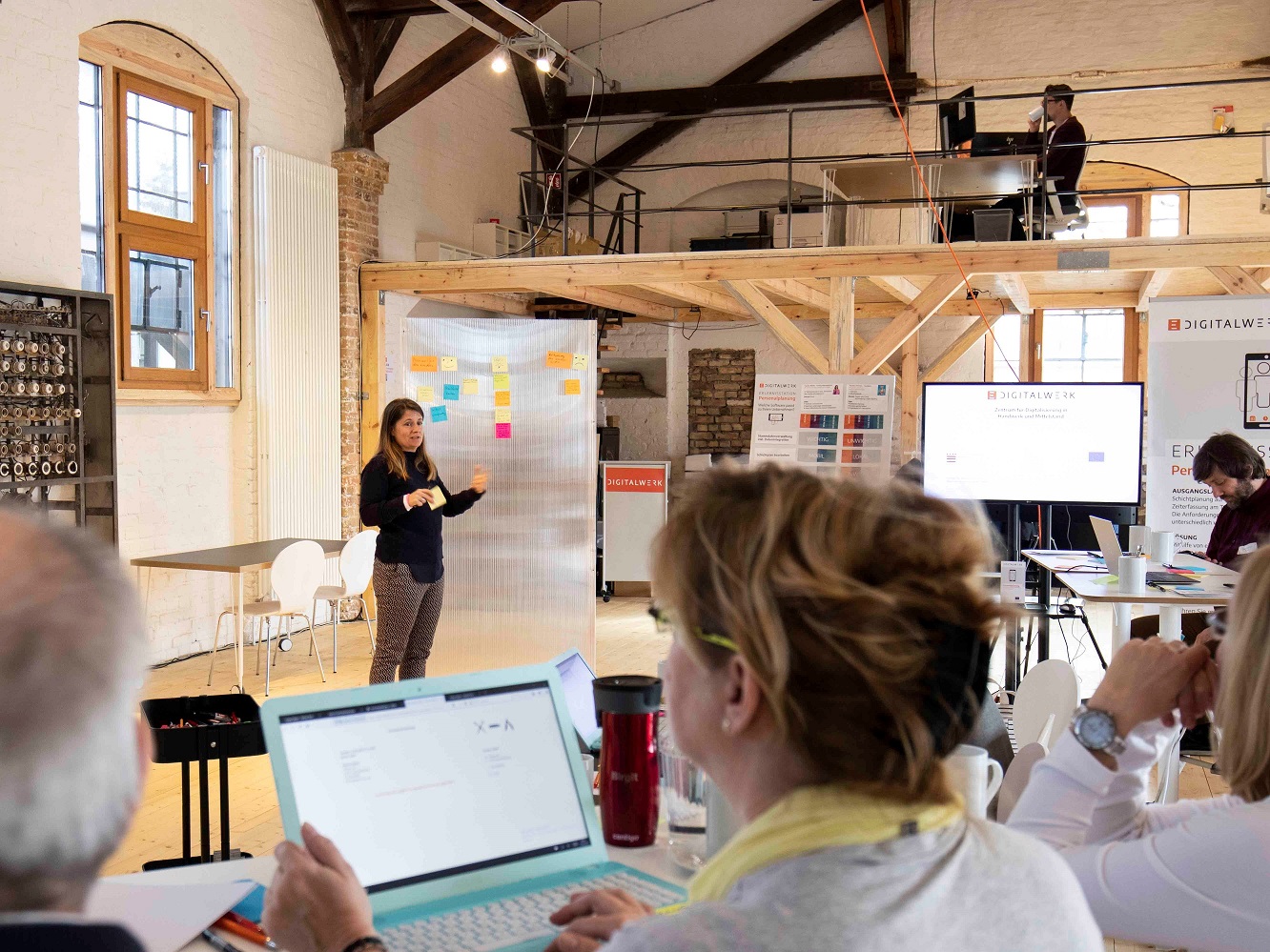Digitalwerk - Centre for digitalisation of SMEs

The Digitalwerk project provides free support to small and medium-sized businesses (SMEs) in Brandenburg undergoing digital transformation – from entry-level solutions to innovative solutions for industry. Workshops and events presenting digital technologies for crafts and SMEs offer an interactive experience for all the senses.
In a virtual environment, Stephan practices replacing a high-voltage socket without any safety risk or use of materials. He puts on virtual-reality glasses, picks up the controllers and learns five basic rules of electrical engineering in a playful way. Virtual Reality (VR) can be used in this way by skilled craft businesses for training and further education. Dangerous situations can be tested off-site.
In addition to virtual reality, there are numerous other ways to use digital technologies in everyday work – but many small companies face challenges when it comes to choosing a suitable solution. This is where the ‘Digitalwerk’ project funded by the European Regional Development Fund (ERDF) can help by preparing digital solutions in a user-orientated way and making practical applications accessible to interested companies.
Look, touch, try out
At interactive stations, digital solutions, such as virtual reality in the crafts sector, digital time recording, cashless payment or digital construction documentation, are explained in just 15 minutes. At seven different stations, participants can try out various solutions independently on the basis of practical cases. The ‘Digital construction and defect documentation’ station, for example, teaches how defects can be recorded on a smartphone or tablet, how construction progress can be documented or how a digital construction diary can be kept to optimise work steps and save time and money. In workshops and events, participants learn which solutions are best-suited for their company. In addition to half day and full day courses, very short ‘digital to go’ sessions are also offered.
Flexible design of project content
“It often happens that there are very different levels of knowledge among the participants of a workshop, for instance,” explains Managing Director Michaela Scheeg. This is also a constant challenge for the project team, because participants should always benefit from coming to Werder. This commitment is very well received and appreciated. “We are pleased to see how well the project is accepted by the target group and the positive feedback from companies. Since we are able to adapt project content to the needs of the user, even during the project itself, we can respond quickly to changing demands of the target groups. This benefits the companies themselves and improves the quality of the project,” says Michaela Scheeg.
For further information, visit digital-werk.org
In a virtual environment, Stephan practices replacing a high-voltage socket without any safety risk or use of materials. He puts on virtual-reality glasses, picks up the controllers and learns five basic rules of electrical engineering in a playful way. Virtual Reality (VR) can be used in this way by skilled craft businesses for training and further education. Dangerous situations can be tested off-site.
In addition to virtual reality, there are numerous other ways to use digital technologies in everyday work – but many small companies face challenges when it comes to choosing a suitable solution. This is where the ‘Digitalwerk’ project funded by the European Regional Development Fund (ERDF) can help by preparing digital solutions in a user-orientated way and making practical applications accessible to interested companies.
Look, touch, try out
At interactive stations, digital solutions, such as virtual reality in the crafts sector, digital time recording, cashless payment or digital construction documentation, are explained in just 15 minutes. At seven different stations, participants can try out various solutions independently on the basis of practical cases. The ‘Digital construction and defect documentation’ station, for example, teaches how defects can be recorded on a smartphone or tablet, how construction progress can be documented or how a digital construction diary can be kept to optimise work steps and save time and money. In workshops and events, participants learn which solutions are best-suited for their company. In addition to half day and full day courses, very short ‘digital to go’ sessions are also offered.
Flexible design of project content
“It often happens that there are very different levels of knowledge among the participants of a workshop, for instance,” explains Managing Director Michaela Scheeg. This is also a constant challenge for the project team, because participants should always benefit from coming to Werder. This commitment is very well received and appreciated. “We are pleased to see how well the project is accepted by the target group and the positive feedback from companies. Since we are able to adapt project content to the needs of the user, even during the project itself, we can respond quickly to changing demands of the target groups. This benefits the companies themselves and improves the quality of the project,” says Michaela Scheeg.
For further information, visit digital-werk.org

